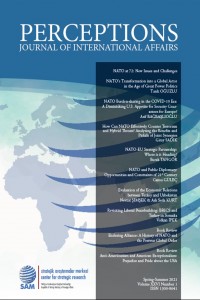NATO Burden-sharing in the COVID-19 Era: A Diminishing U.S. Appetite for Security Guarantees for Europe?
Abstract
Burden-sharing is not a new area of contention among NATO members. In the post-Cold War period, due to changes in the international conjuncture, burden-sharing has continued to be on NATO’s agenda through various periods and with different intensities. Among the various differences in attitudes and interests regarding NATO policies between the U.S. and European members, U.S. governments have raised the issue of burden-sharing in particular to emphasize that the U.S. spends more on defending Europe’s security than do the European allies themselves. This article evaluates the burden-sharing issue, explains why it is constantly being raised by the U.S. and suggests concepts and policies with which to solve it. The article also discusses the effects of the COVID-19 pandemic on NATO, arguing that the most important challenge will be the pandemic’s effect on the global economy. Relatedly, COVID-19’s impact may also affect the success of NATO’s policies and the U.S.’s influence on its European NATO allies in regard to its policies toward China. This suggests that burden-sharing will continue to occupy NATO’s agenda in the years ahead.
References
- References are indicated in the article References are indicated in the article References are indicated in the article
Details
| Primary Language | English |
|---|---|
| Subjects | Political Science |
| Journal Section | Articles |
| Authors | |
| Publication Date | August 2, 2021 |
| Published in Issue | Year 2021 Volume: 26 Issue: 1 |


